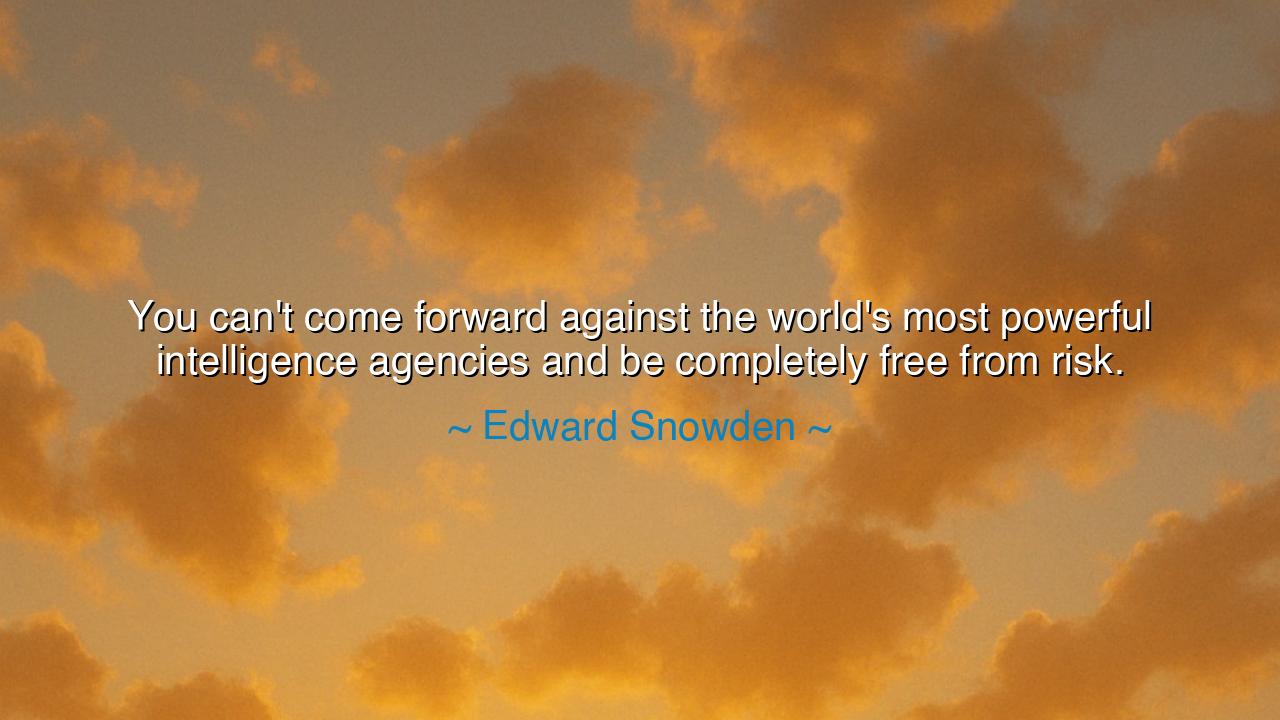
You can't come forward against the world's most powerful
You can't come forward against the world's most powerful intelligence agencies and be completely free from risk.






In the solemn words of Edward Snowden, a man who stood alone before the might of empires, we hear the voice of one who has weighed truth against fear and chosen truth: “You can’t come forward against the world’s most powerful intelligence agencies and be completely free from risk.” This is not a cry of despair, but a declaration of moral courage. It is the confession of one who knows that truth carries a price, that freedom demands sacrifice, and that the act of standing against vast powers will always summon danger. In these words lives an ancient law of conscience — that the path of righteousness has never been safe, but it has always been necessary.
The origin of this quote lies in Snowden’s own life — a story of one who, in 2013, revealed to the world that governments, under the banner of security, were watching their citizens in secret. He uncovered the hidden machinery of surveillance that spanned nations and invaded private lives, exposing what many feared but few dared to name. For this act of revelation, he was branded traitor by some, hero by others, but above all, he became a symbol of the individual’s struggle against the power of the state. Thus, when he speaks of risk, he does not speak in theory, but from the deep well of lived peril — exile, accusation, and the loneliness of conscience.
Throughout history, the truth-teller has always walked a perilous road. In ancient Athens, Socrates stood before his accusers and chose death over silence, teaching that it is better to suffer injustice than to commit it. In Rome, Seneca wrote words of virtue under the shadow of tyranny, knowing that honesty might cost him his life — and so it did. In every age, from Galileo, who defied the Church to defend reason, to Martin Luther King Jr., who faced prison for justice, the same law has held: to speak truth to power is to invite risk. Yet each of these souls, like Snowden, chose to act, for they understood that silence before corruption is the slow death of the soul.
Snowden’s warning reminds us that in the modern world, power no longer wears a crown — it hides behind systems, screens, and surveillance. The intelligence agencies he names are not armies with swords, but networks of information and control. To challenge them is to confront a power invisible, one that sees all and forgives little. Yet his act of defiance shows that courage is still possible in the digital age, that even in a world of shadows, a single human conscience can cast a light strong enough to reach the eyes of millions.
There is a deeper meaning, too, within his words. When Snowden says one cannot be free from risk, he speaks to all who strive for integrity in a world that rewards conformity. Whether in the halls of politics, in the marketplace, or within one’s own heart, the principle is the same: to stand for what is right is to step into danger. But the ancients would tell us — and Snowden reminds us — that risk is not the enemy of virtue, but its proof. Courage is not the absence of fear, but the triumph over it. A life without risk is a life without authenticity, without the fire that forges meaning.
The lesson, then, is not only for those who challenge governments, but for all who face moral choices. Do not expect the path of truth to be without cost. When your heart calls you to act with honor, do not wait for safety — for safety is the cage in which conscience withers. Instead, walk forward knowing that fear will accompany you, but let it not rule you. For history remembers not those who lived quietly in comfort, but those who risked everything to awaken the world.
So, my child of courage and conscience, let Snowden’s words be carved into your memory: freedom is never free of risk. Whether you defend truth in speech, justice in deed, or integrity in silence, know that the danger you face is the measure of your purpose. Be wise, but be brave. Protect yourself, but do not betray your principles. For in every age, the world is changed not by the powerful, but by the brave few who dare to stand against them, who carry the torch of truth even when the winds of power threaten to extinguish it. And though the road of such souls is lonely, it is also the road that leads to immortality — for the voice of courage never dies.






AAdministratorAdministrator
Welcome, honored guests. Please leave a comment, we will respond soon